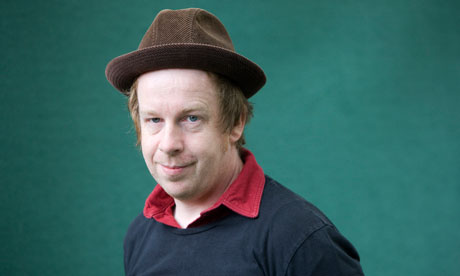
How did you come to write City of Bohane?
I am an evil megalomaniac, and so for a long while I had wanted to build a little city of my own. But I couldn't begin until I knew what the place was called. Then, one night – and honestly, I hate to lurch into melodrama here – I had what I can only describe as A Vision … I woke up trembling, in a fever sweat, and I sat bolt upright in the bed, and I cried out the single word "Bohane!". I began the novel the next morning.
What was most difficult about it?
It involved recasting the English language to convincingly describe the life of a malevolent west of Ireland city in the middle of the 21st century. The novel is a kind of weird retro-fitted future-Western, with lots of gratuitous swearing, hideous violence, perverse sex and powerful opiates, but above all it's a projection of what the street talk might sound like among hipster hoodlums in such a city in the 2050s.
What did you most enjoy?
Describing the clobber. There is a taste in the city of Bohane for white leather catsuits, thigh-high boots of Portuguese leather, three-quarter-length mink jackets, goatskin beanie hats, goldie-lookin' chains, and much, much more.
How long did it take?
The first draft took 13 weeks, during which time I never actually slept but occasionally fainted. The second draft took four months. The third took five weeks. Then a couple of months' editing. So, all in all, a little less than a year.
What has changed for you since it was first published?
I've started getting invited to SF conventions, which is wonderful, even though there is no science and no technology in the book. But I'm an admirer of the work that's being done in what people still insist on calling "the genres". Realist literary fiction is, of course, the hoariest (and dullest) of all the genres, and it's critical now that writers work to break down the false divides and barriers.
Who's your favourite writer?
There are dozens but I have always felt a special affinity with VS Pritchett. He worked from the ear, primarily, as I do, and he was an all-rounder, writing short stories, novels, memoir, travelogue, critical biography. He lived to be almost 100, and he never stopped, and his work is unified by a great generosity of spirit.
What are your other inspirations?
Early in the morning, Turkish coffee. Late in the evening, whiskey and the pipe. Also, the way people speak. And the hauntedness of certain places. And box-sets of Trojan Records dub reggae from the 1970s. And the TV dramas of David Milch and David Simon. And the comics of Los Bros Hernandez. And … I could go on, endlessly.
Give us a writing tip.
When you wake up, instead of checking emails on your phone, or counting your retweets, pick up a pen and scratch a few sentences into a notebook. Writing is very close to dreaming, it comes from the same sub-conscious murk and flux, and first thing in the morning – when you're still puddled in dream-melt, as Don DeLillo says – is a wonderful time to explore the true depths.
What, if anything, would you do differently if you were starting the book again?
When I recorded the audio book version, I noticed a certain glee in my soul whenever a couple of characters emerged – a homicidal, super-sexy, teenage vixen named Jenni Ching and a boozy, pilled-up, 89-year-old weapon named Girly Hartnett. I think they should feature more. And they probably will do when and if I write a sequel.
What are you working on now?
City of Bohane has been optioned for film and I've finished a first draft of the script. I've also finished a book of stories called Dark Lies the Island, which is out in April. I'm now on a new novel, and some new stories, and another film script, about horseracing, called The Gee Gees. The goal is utter world domination.

